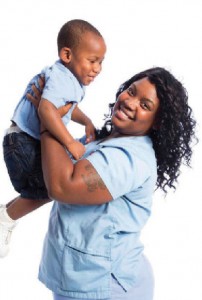Jefferson State Student Shares Her Story From Struggle To Success
By Sherrel Stewart
WBHM
 About 90,000 women in Jefferson County, many of them single mothers, live in poverty. Monique Jones isn’t in that number anymore. She climbed up.
About 90,000 women in Jefferson County, many of them single mothers, live in poverty. Monique Jones isn’t in that number anymore. She climbed up.
Friday, she’ll share the story of her journey in Colorado with leaders from across the country at the Aspen Institute, a prominent national think tank.
The mother of two now has a steady job, benefits and a place for her family to live. Just a couple of years ago it wasn’t that way.
“I was actually working as a sales associate at Target. Basically living paycheck to paycheck. You have hours one week. You don’t have them the next week,” she says.
“The money wasn’t good enough to take care of two children and a household.”
At one point the financial strain forced the family to temporarily go in different directions.
“My daughter had to stay with her godparents and my son was with his dad, because I could not afford to take care of a household,” she says.
A friend told Jones about a program offered at Jeff State Community College that provided tuition and childcare support for women looking to better themselves. Even after getting the details, she says she questioned how she could make it work as she tried to get all the hours she could on the job and be there for her children.
The Women’s Fund of Greater Birmingham, Jeff State and its partners considered those challenges in designing the collaborative program, says Mary Page Wilson-Lyons, program director at the Women’s Fund.
“Together with the Women’s Fund and the Aspen Institute in D.C. we put together a program that would provide wrap around services, transportation, childcare subsidies and tuition for a class that would lead into a job as well as a full time career coach,” Wilson-Lyons said.
She’s joining Jones for the presentation in Colorado for the conference called the National Think X Change. It’s a national conversation on two-generational solutions to poverty, lifting mothers and their children.
Even with the support and wrap around services for the 10 weeks, Monique says the balance of work, school and family was an emotional drain.
“In the middle of the program it got kind of bad and so I had a breakdown. I went to my career counselor and I just boohooed. I laid it out and told her I can’t do this,” Jones recalls. “I just wanted to quit. I wanted to give up. She said ‘Monique you can’t. You have two kids. What will you tell them?’”
Jones’ perseverance and upbeat attitude are contagious, says Wilson-Lyons.
“She has been a real inspiration to us all. She not only did very well in the pharmacy technician program,” Wilson-Lyons says. “She went on, and like many others in the program and got a job working at a pharmacy. It’s a good job. It’s a pretty well-paying job and there are opportunities for advancement.”
As she looks back over the past two years, Jones says she sees things differently.
“I did not realize I was in poverty at the time, but after I came out of it, I realized I was,” Jones says.
Now she says she has more to look forward to — continued work as a pharmacy technician and enrolling in school to begin studies in nursing.
“Everything has changed for the better for us. I’m excited because there is still more to come,” Jones says. “ We can only go up from here.”
Wilson Lyons says she hopes Jones’s story helps leaders from other parts of the country consider establishing similar programs to help women re-boot their lives.



